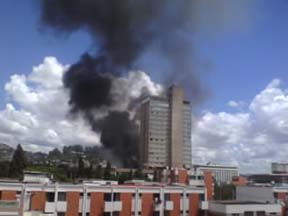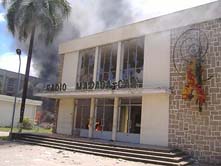New York, January 26, 2008–Angry opposition supporters burned down two pro-government television stations in the Indian Ocean island of Madagascar today, a few hours after authorities destroyed the antenna of an opposition radio station, according to news reports and local journalists.
The violence highlighted escalating political tensions between Malagasy President Marc Ravalomanana and rival Andry Rajoelina, the mayor of the capital, Antananarivo, since the government summarily shut down the mayor’s television station last month, according to CPJ research. Rajoelina, a 34-year-old outspoken politician, is leading a popular anti-government movement modeled after Ukraine’s 2004 pro-democracy Orange Revolution, according to international news reports.
At least four cars were set on fire and smoke billowed from the studios of the state-run national broadcaster, Radio Nationale Malgache and Télévision Nationale Malgache, after thousands of protestors attacked the complex around 1 p.m. local time, according to freelance journalist Jeannot Ramambazafy.

An hour later, protesters burned down the studios of Malagasy Broadcasting System, a station owned by President Ravalomanana, according to local news reports and local journalists. A 14-year-old demonstrator and a policeman died in clashes at the scene, according to local reporters.
Earlier, at around 3 a.m., about a dozen armed government security agents disabled the transmitter of Viva Radio, a station owned by Rajoelina, according to local journalists. Communications Minister Bruno Andriantavison had threatened to shut down the station last week, saying that the commentary on a morning call-in program had incited civil disobedience and undermined “the public’s trust towards national institutions,” the local media quoted an official letter as saying.
“Media outlets have become the undeserving targets of political feuding and violence between the government and opposition forces,” CPJ’s Africa program coordinator, Tom Rhodes, said. “The political leaders from both parties must call for an immediate end to attacks on these facilities, which endanger the lives of the journalists who work there.”
In a prior incident, on January 9, two unidentified attackers threw a small bomb with a warning note about the program in the home of veteran journalist Harry Laurent Rahajason, better known as Rolly Mercia, according to local journalists. No one was injured, the journalists said.
Media outlets owned by Rajoelina and independent stations providing coverage of his political activities have been the targets of government censorship since December 13 when authorities shut down Viva TV, a sister station to Viva Radio also owned by Ravalomanana, according to CPJ research. An order signed by Communications Minister Bruno Andriatavison and obtained by CPJ accused Viva TV of broadcasting “statements likely to trouble security and public order” after the station aired a November full-length interview with exiled former president Didier Ratsiraka, according to local journalists. The government deemed the remarks likely to “incite civil disorder.” Andriatavison subsequently withdrew the license of Viva TV and and security forces seized the station’s transmitter on January 18.
